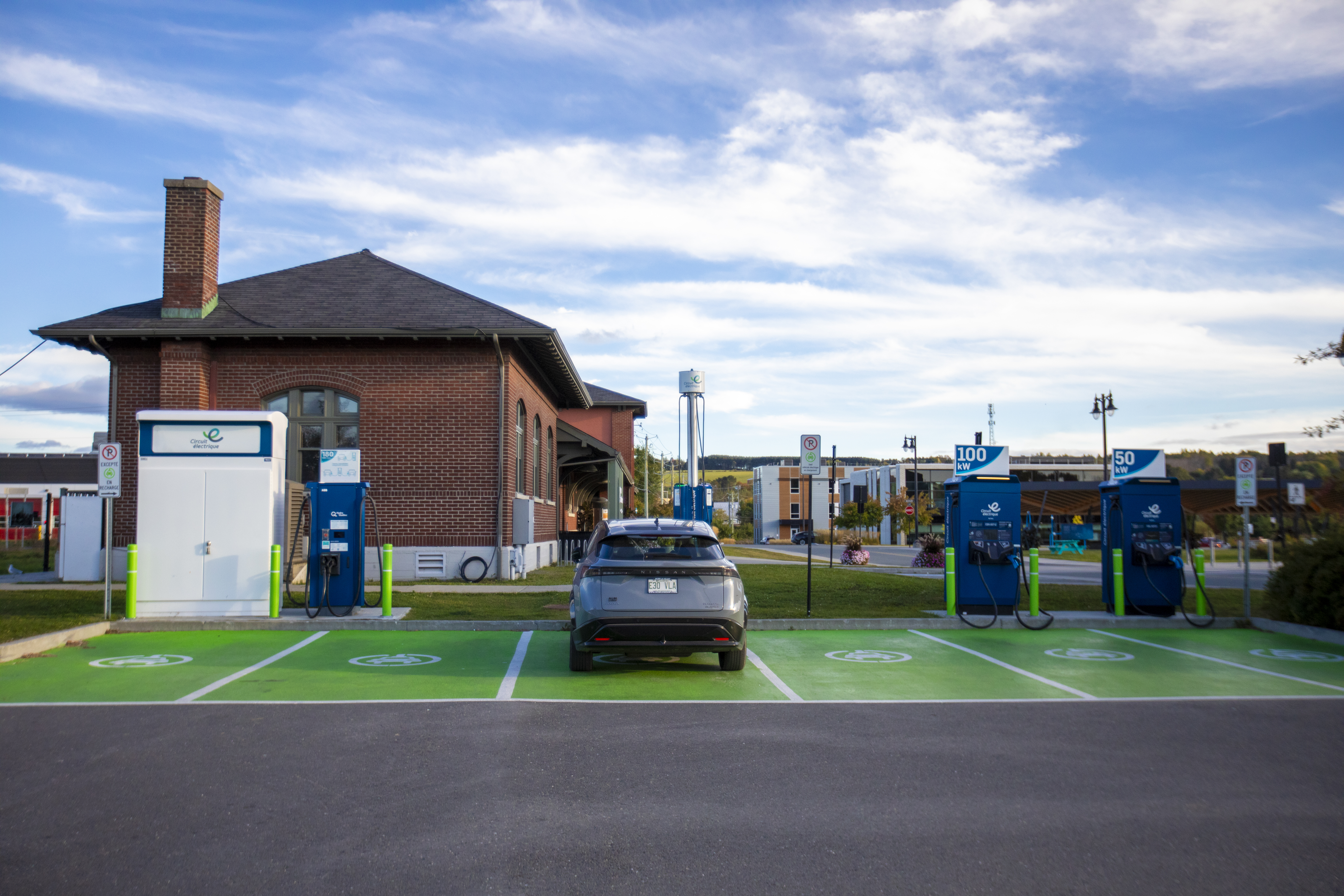
40% of the population took part in the inaugural Energy Transition Week
Honourable mention, FCM’s Sustainable Communities Awards in the Reconciliation and anti-racism, equity and inclusion (R-AREI) category
Summary
Lac-Mégantic launched its Energy Transition Plan in 2024, targeting a 22% reduction in greenhouse-gas emissions by 2030 and net zero by 2050. The plan, dubbed Mission Mégawatt, now has the whole community on board to achieve its ecological and sustainability targets. It’s an expression of the people’s resolve to make 2013 rail disaster mean something.
Background
A runaway tanker train derailed in July 2013 and burst into flames, devastating the Lac-Mégantic downtown core. There were 47 deaths, numerous injuries and an oil spill without precedent. More than 100 homes were destroyed, 80% of which were affordable or social housing.
The rural municipality of 5,747 in Quebec refused to throw in the towel. Instead, it made a commitment to build back green with an emphasis on sustainability, which would also reduce its reliance on fossil fuels.
Lac-Mégantic today has a Hydro-Québec microgrid that’s been supplying the downtown core with clean electricity using solar panels and batteries since it came online in 2021. Surplus power is transferred to Hydro-Québec’s main grid. The microgrid is a technological showcase that Lac-Mégantic is capitalizing on as part of its strategy for the energy transition.
Part of the funding for Mission Mégawatt is covered by profits from a wind farm in the Granit RCM that Lac-Mégantic is a partner of.
The challenges
Lac-Mégantic’s energy transition plan is part of the 2020–2025 strategic plan, with its emphasis on environmental stewardship and renewable energy.
Implementing that plan, however, is not without its challenges:
- Governance: maintain continuity with strong, clear messaging by municipal authorities.
- Resources: prioritize investments to respect financial capacity.
- Sustainability: establish an energy transition culture in municipal departments and Council.

The approach
Lac-Mégantic is working with a range of partners to achieve its energy transition plan objectives, including the Commission on Innovation and the Ecological Transition, a citizens’ committee that advises elected officials and supports mobilization, education and awareness initiatives.
Consulting with municipal departments and Commission members, Lac-Mégantic aims to:
- foster an inclusive and equitable citizens’ movement
- bring the people of Lac-Mégantic closer together
- get young people involved, from elementary school up
“Anytime we can get people involved, we will.”
- Julie Morin, Mayor of Lac-Mégantic
The impacts
In 2022, Lac-Mégantic made an inventory of GHG emissions in its jurisdiction. The inventory will be used to benchmark energy transition plan results in future years.
Here are some of the results to date:
- great response to the 1st Energy Transition Week (40% of the population)
- events, challenges and talks to raise public, business and partner awareness
- new Innovation Hub on smart, renewable-energy microgrids established with the University of Sherbrooke
- new help desk for energy-efficient buildings established, a free support service to help people with renovation and construction projects
- in collaboration with Hydro-Québec:
- production of educational materials to improve young people’s energy literacy
- research on public participation in the energy transition
- use of energy transition technology (heat pumps, solar panels, thermic accumulators, etc.) in social housing currently being built
- provision of grants to support individual initiatives
What we’ve accomplished
The team has come up with some remarkable initiatives in recent months. It established the Mission Mégawatt brand to coordinate its work and get people’s attention. There’s a website to engage the public, update people on plan progress and run regular challenges.
Inclusion is key. That’s why youth, seniors, newcomers, people with disabilities and families have been brought into the project through Transition Commission activities.
There’s also new housing for vulnerable low-income populations, such as the 21 apartments in the Le Chevalier Building. Le Chevalier is a real technology showcase with its hybrid solar panels, local thermic accumulators and heat pumps.
Next steps
Lac-Mégantic aspires to be a leader and model for the energy transition in rural Québec and all of Canada. The plan incorporates 20 actions by 2027, in six areas: transportation, buildings, urban agriculture, industry, waste materials and awareness. It will be reviewed every three years.
“Mission Mégawatt is much more than an energy transition project—it’s a community working together to reduce our reliance on fossil fuels and inspire other communities to do the same.”
- Julie Morin, Mayor of Lac-Mégantic

Sustainable Communities Awards
Case study: Sustainable homes, stronger community
How one award-winning apartment building project in Waterloo Region combines affordability, community and sustainability
Read moreCase study: Sustainable heating from unlikely sources
Metro Vancouver’s award-winning policy turns waste heat into community power
Read moreCommunity Energy Systems
Available funding: We support projects at various stages of development through grants and loans. Funding amounts are based on total eligible costs. Further details on eligible costs are provided on individual funding pages.
Business case: Community Energy Systems
Funding to assess viable community energy projects and their business models
Read moreStudy: Community Energy Systems
Funding to outline the design of a proposed community energy system
Read moreCapital project: Community Energy Systems
Funding to construct, commission and rapidly deploy a community energy system
Read moreWant to explore all GMF-funded projects? Check out the Projects Database for a complete overview of funded projects and get inspired by municipalities of all sizes, across Canada.

